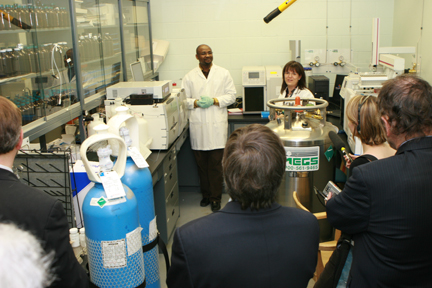Nouvelles
INAUGURATION OF CREDEAU AT POLYTECHNIQUE - Québec and Canada now equipped with new analytical capabilities for water treatment technologies to track emerging contaminants and preserve water quality
Founded in 2003, CREDEAU offers a technological platform, unique in Canada, that tests and validates most water treatment technologies in the laboratory, including bench-scale testing and semi-industrial pilot testing. The Centre was founded as a collaboration between five universities (École Polytechnique, École de technologie supérieure, Université du Québec à Montréal, McGill University and INRS-Institut Armand-Frappier) and is receiving grants totalling $12.5 million from the Canada Foundation for Innovation ($5 million), the Ministère de l'Éducation, du Loisir et du Sport du Québec ($5 million) and industry partners ($2.5 million), including John Meunier Inc. and Degrémont Technologies.
Remarkable analytical capabilities
The new equipment at CREDEAU's disposal allows researchers to detect and identify various emerging contaminants, such as
pharmaceutical components, that are being found in increasing concentrations in our water. "To control the contaminants, we
first need to be able to see them," said Raymond Desjardins, full professor in the Department of Civil, Geological and Mining
Engineering at École Polytechnique and Director of CREDEAU. "The analytical tools we have acquired are like a new pair of
glasses, through which we can analyze and eventually control the pollutants we have thus far been unable to detect or precisely
quantify. Take, for example, algae toxins, the toxic contaminants released by the blue algae that proliferate in Québec waters.
Using our equipment, we can now quantify and analyze the toxins present in various types of water, and ultimately we can ensure
that those toxins don't make their way all the way into our taps."
Professor Desjardins continued: "Our researchers are tackling a number of emerging problems, such as micro-organisms that are
resistant to disinfection, endocrine disrupting compounds and buried infrastructures -- problems for which, at the moment, we
have only fragmented information. We are refining our understanding of the risks caused by the substances poured into our
water. Without wishing to be alarmist, I must say that recent discoveries show that it's imperative that we continue the pace
of our research in this area."
For his part, Professor Savard said: "Our research teams now have the ability to carry out the technical and economic
validation of innovative technologies for water treatment on various scales, and to transfer that technological knowledge to
users."
With CREDEAU, researchers have acquired, among other things, three mobile water treatment units that act as veritable water
treatment plants on wheels. Highly instrumented, completely automated and designed with exceptional flexibility, these mobile
units can provide pilot-scale in situ validation of a large number of processes and combinations of processes as a function of
variations in the quality of raw water.
"One of these units is currently installed at the Atwater plant," Professor Desjardins noted. "Our researchers and their
students have been testing various procedures there for the past year. The results of this research will help Montréal
authorities to make informed choices when it comes to upgrading the plant."

Mobile water treatment unit at the Atwater plant.
(Ville de Montréal/Eric W. Schaeffer)
Dr. Eliot Phillipson, President and CEO of the CFI, said: "The Canada Foundation for Innovation is proud to contribute to the advancement of knowledge and to increase the quality of research and training in the crucial field of water treatment. Our financial contribution to CREDEAU is fully in keeping with our mission."
A centre for synergy
Much more than a collection of equipment, CREDEAU is above all a centre for synergy, bringing together top human resources in
water treatment. The Centre's 11 founding researchers possess established capabilities in the realm of treatment of drinking
water and wastewater, and are internationally recognized in the field. The 11 are Raymond Desjardins, Michèle Prévost, Benoit
Barbeau, Yves Comeau, Paul Stuart and Christophe Guy of École Polytechnique de Montréal; Robert Hausler of École de Technologie
Supérieure; René Roy and Mircea Mateescu of UQÀM; Ronald Gehr of McGill University; and Pierre Payment of INRS-Institut
Armand-Frappier.
By grouping under a single roof researchers who are looking at wastewater and those who are interested in the treatment and distribution of drinking water, CREDEAU has set the stage for an integrated understanding of the issues and will increase the efficiency of water protection work.
In addition to the research professors, the Centre brings together nearly 100 people: research associates, laboratory and fieldwork teams, technicians, university contributors and graduate students.
The main industry members of CREDEAU are the firms John Meunier Inc. and Degrémont Technologies, which are respectively part of Veolia Environnement and Suez, world leaders in environmental services. John Meunier Inc. and Degrémont Technologies conduct various activities in the realm of research, development, design and production of environmental technologies. They serve North American municipalities and industries, providing them with innovative water-treatment solutions. Their association with CREDEAU gives them preferred access to an international network of centres of excellence and cutting-edge analysis laboratories.
Three cities already benefiting from CREDEAU expertise
The research projects being conducted by CREDEAU teams will serve to support authorities' decision-making with regard to the
upgrading of water treatment plants, among others. The Ville de Montréal, which over the next 20 years will be investing nearly
$4 billion in its water infrastructures, including more than $300 million for the upgrading of its drinking-water treatment
plants, is one of the municipalities, along with the cities of Laval and Saint-Hyacinthe benefiting from the groundbreaking
work being carried out by CREDEAU researchers.
Laval and Montréal serve more than 2 million citizens from 10 treatment plants that draw their water from sources representative of the quality of Canadian surface waters: the St-Lawrence River, Lake St-Louis, Lac des Deux-Montagnes, and the Ottawa, Mille-Îles and Des Prairies rivers. The Ville de Montréal's wastewater treatment plant processes 50% of Québec's wastewater. Its capacity, around 2.5 million cubic metres per day, makes it the largest physico-chemical treatment station in America. Located in the Montérégie region, not far from Montréal, Saint-Hyacinthe is the centre of a vast agricultural and agri-food region. Saint-Hyacinthe's treatment plant opened in 1987 and serves a population of about 50,000 people.
Training of an indispensable new generation
There is a strong need for highly qualified staff in the field of water treatment in Québec, Canada and internationally. The
presence of emerging pollutants and the implementation of new standards have led to major investments in many municipalities,
and there is currently a shortage of qualified labour in the field. It is no coincidence that the training of qualified staff
is one of CREDEAU's priorities. Right now, there are over 70 graduate students pursuing research work at the centre under the
supervision of the founding researchers. The five participating universities serve more than 55% of Québec graduate-level
students and 10% of Canadian ones in the field of environmental engineering (civil and chemical).
"The creation of CREDEAU gives us irrefutable proof of the need to invest in our post-secondary establishments and in leading-edge research," said Ms. Courchesne. "Innovation, research and the transfer of knowledge are key elements of our society's advancement. The work that will be carried out through CREDEAU will directly benefit public health and well-being. I am proud of my ministry's financial contribution of $5 million to this magnificent project."







